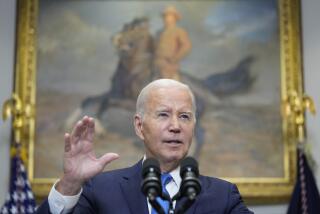Romney swings at Obama’s auto bailout, hits himself
- Share via
One of President Obama’s talking points on the campaign trail has been the revival of General Motors and Chrysler, which would almost certainly have gone into liquidation had his administration not kept them afloat through a government-led bankruptcy and restructuring in 2009. But a commercial that Republican presidential candidate Mitt Romney has been airing in Ohio (and online) tries to cast Obama’s actions in a considerably more negative light.
That’s not surprising in and of itself. What’s surprising is that the criticism sounds so anti-free-market, so anti-... Mitt Romney.
In the ad, titled “Who will do more?,” the narrator notes the support Romney has received from former Chrysler chief Lee Iacocca and the conservative Detroit News. Then, against a backdrop of cars being crushed into scrap metal, the narrator says, “Obama took GM and Chrysler into bankruptcy.”
SLIDESHOW: Six numbers to ignore from the presidential campaign
Yes he did. Of course, that’s also what Romney called for in a New York Times op-ed in 2008, when the Big Three were pleading with Congress for a federal bailout. “A managed bankruptcy may be the only path to the fundamental restructuring the industry needs,” he wrote, arguing that the federal government’s help should be limited to investments in basic research, “guarantees for post-bankruptcy financing” and assurances that buyers’ warranties would be honored.
The difference between the two approaches is that Obama was willing to provide the loans necessary to keep GM and Chrysler operating as they went through bankruptcy. The most Romney would have done was provide guarantees for private-sector loans, on the quixotic belief that such guarantees would entice banks to step in with billions of dollars in otherwise high-risk loans at the height of the credit crunch.
Direct loans were the only sure way to keep the companies going, and judging by an op-ed Romney wrote for the Detroit News in February, that route simply wasn’t acceptable to him.
In that piece, Romney excoriates the “crony capitalism” that led to, among other things, the Treasury Department becoming a major shareholder in GM. But that was an unavoidable outcome of the administration’s “debtor in possession” loans, which were converted from debt to equity (that is, shares) as part of the restructuring.
Here’s how the Detroit News put it in the same editorial that endorsed Romney:
“The president stepped up with the support the two automakers needed to keep themselves and their suppliers in business. We have said in past editorials that while Romney rightly advocated for structured bankruptcies in his infamous ‘Let Detroit Go Bankrupt’ New York Times op-ed, he was wrong in suggesting the automakers could have found operating capital in the private markets. In that article, Romney suggested government-backed loans to keep the companies afloat post bankruptcy. But what GM and Chrysler needed were bridge loans to get them through the process, and the private credit markets were unwilling to provide them. Obama put a rescue team to work and they were true to the task.”
Naturally, Romney’s ad doesn’t stop there. It goes on to claim that the administration “sold Chrysler to Italians who are going to build Jeeps in China.” Although Italian automaker Fiat did buy Chrysler (as well as the federal government’s stake in the company), the claim about China is “simply not true,” according to FactCheck.org, citing a statement by Chrysler. The company says it’s exploring ways to increase production of Jeeps in China and “has no intention of shifting production of its Jeep models out of North America” (emphasis in the original).
More than that, it’s beyond cynical for a supposed defender of free-market capitalism to complain about a privately owned company’s decision to locate manufacturing assets where they best serve the company’s interests. But Romney’s been stung by reports that the private-equity firm he ran, Bain Capital, invested in numerous companies that sent jobs overseas -- reports that Obama and his allies have touted throughout the campaign. Clearly, demagoguery about offshoring isn’t the exclusive province of Democrats in this campaign.
Obama’s handling of the auto bailout provides plenty of material for critics; the administration was deeply involved in the decisions about how losses would be allocated among the creditors, and some creditors argue that their interests were subordinated for political reasons. Romney should stick to the issues where there’s a real dispute, rather than trying to make Obama look like a villain for doing the very things Romney would have done.
ALSO:
Taking the bankers to courtStephen King gets kicked out of high school
Voter Intimidation in Ohio? Not that I could see
Follow Jon Healey on Twitter @jcahealey
More to Read
A cure for the common opinion
Get thought-provoking perspectives with our weekly newsletter.
You may occasionally receive promotional content from the Los Angeles Times.











